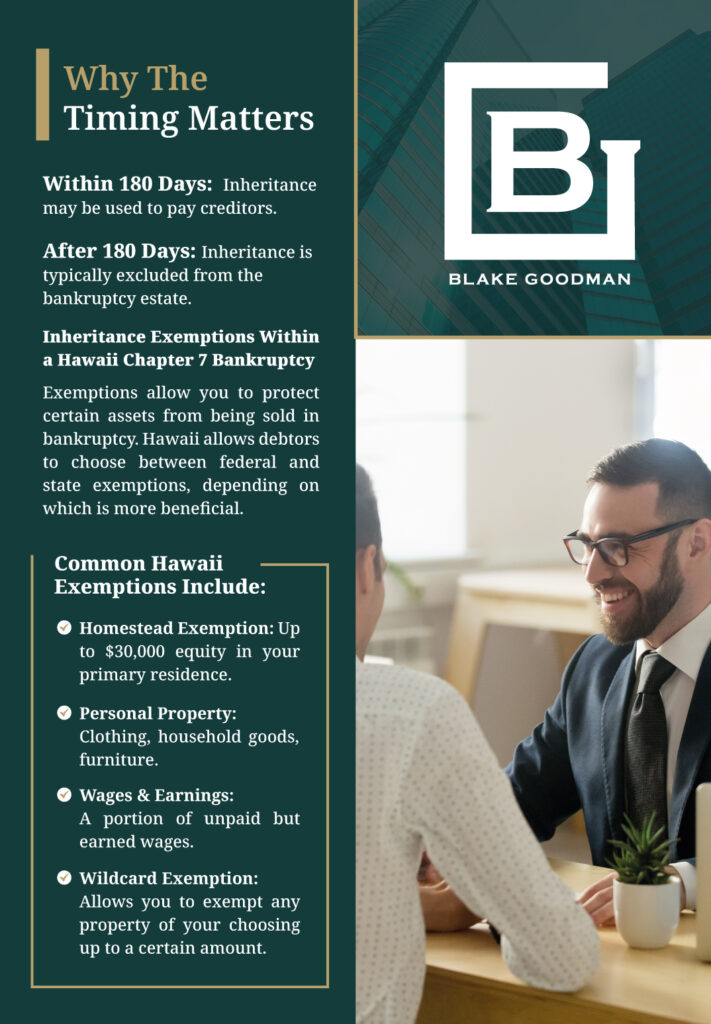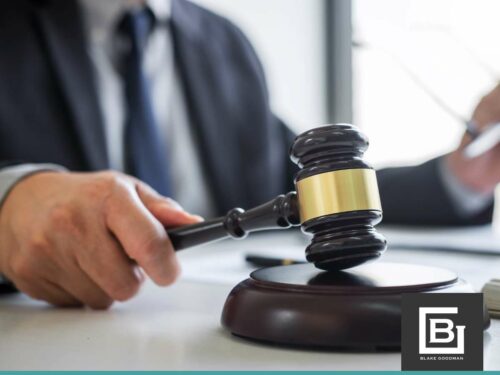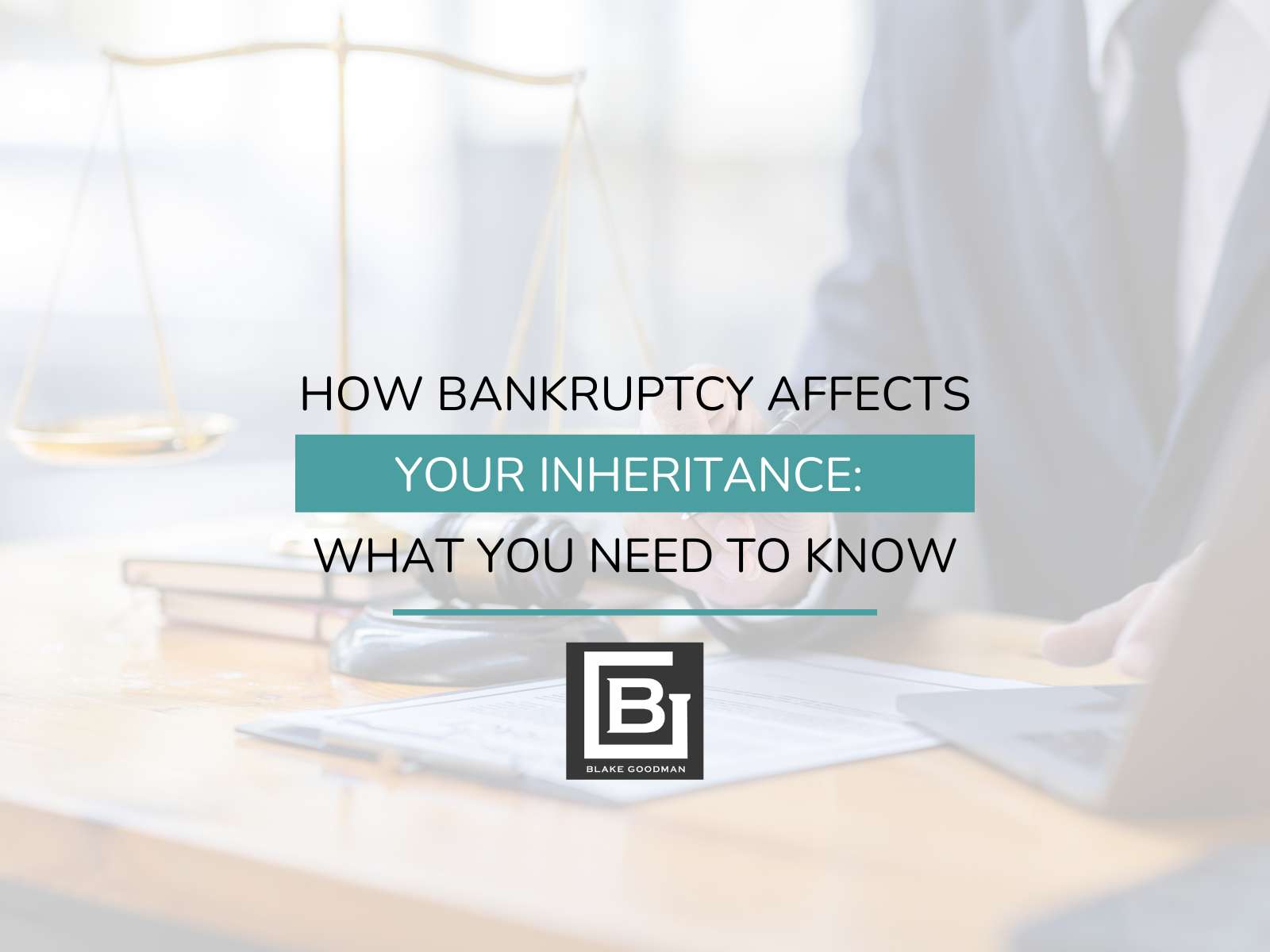Can You Keep Your Inheritance During Bankruptcy? Key Factors To Consider
Filing for bankruptcy is often a difficult decision, stemming from overwhelming debts and financial stress. Receiving an inheritance during this time might seem like a lifeline—a chance to regain financial stability. However, whether you can keep your inheritance during bankruptcy depends on several critical factors, including:
- Timing of the Inheritance
- Type of Bankruptcy Filed (Chapter 7 or Chapter 13)
- Applicable Exemptions in Hawaii
In this comprehensive guide, we’ll explore how bankruptcy affects your inheritance and what you need to know to navigate this complex situation.
Understanding How Chapter 7 Bankruptcy Affects Your Assets & Inheritance

Non-Exempt Assets Typically Include:
- Luxury Items: Jewelry, designer clothing
- Second Homes & Vacation Properties
- Vehicles With High Equity
- Non-Retirement Investment Accounts
- Cash, Bank Accounts & Savings
- Collectibles & Antiques
- Recreational Vehicles: Boats, motorcycles, ATVs
How Inheritance Is Treated In Chapter 7 Bankruptcy
Inheritance received within 180 days after filing for bankruptcy becomes part of the bankruptcy estate. This means the trustee can use it to pay off your creditors. However, if your inheritance qualifies for an exemption, you may be able to keep some or all of it
Understanding The 180-Day Rule
The 180-day rule (11 U.S.C. § 541(a)(5)(A)) states that any inheritance you become entitled to receive within 180 days of filing for bankruptcy becomes part of your bankruptcy estate.
- Key Point: The 180 days start from the date of the decedent’s death, not when you actually receive the inheritance.
Example:
- If a relative passes away 90 days after you file for bankruptcy, any inheritance you receive from them is part of your bankruptcy estate.
- If they pass away 190 days after filing, the inheritance is generally yours to keep.
Why The Timing Matters
- Within 180 Days: Inheritance may be used to pay creditors.
- After 180 Days: Inheritance is typically excluded from the bankruptcy estate.
Inheritance Exemptions Within a Hawaii Chapter 7 Bankruptcy
Exemptions allow you to protect certain assets from being sold in bankruptcy. Hawaii allows debtors to choose between federal and state exemptions, depending on which is more beneficial.
Common Hawaii Exemptions Include:
- Homestead Exemption: Up to $30,000 equity in your primary residence.
- Personal Property: Clothing, household goods, furniture.
- Wages & Earnings: A portion of unpaid but earned wages.
- Wildcard Exemption: Allows you to exempt any property of your choosing up to a certain amount.

Applying Exemptions To Your Inheritance
If your inheritance falls within the exemption limits, you may be able to keep it.
Example:
- Inherited Home: If you inherit a home with $25,000 in equity, you can use the homestead exemption to protect it.
- Cash Inheritance: Using the wildcard exemption, you may protect a portion of a cash inheritance.
Exemptions are complex, and maximizing them often requires the expertise of a bankruptcy attorney.
Chapter 13 Bankruptcy In Hawaii & Inheritance
In Chapter 13 bankruptcy, you propose a repayment plan to pay back all or a portion of your debts over 3 to 5 years. You keep your assets, but your disposable income goes towards the repayment plan.
Inheritance Received Before or During the Plan: Non-exempt inheritance may increase the amount you have to pay to unsecured creditors.
Modification Of The Plan: If you receive a significant inheritance, the trustee may seek to modify your repayment plan to include the additional funds.
Benefits Of Chapter 13 Regarding Inheritance
- Asset Retention: You don’t have to liquidate assets.
- Flexibility: Potential to adjust the repayment plan if circumstances change.
Your Legal Obligation To Report Inheritance During Bankruptcy In Hawaii
You are legally required to disclose all assets, including any inheritance you become entitled to within the 180-day window.
Failure To Report Can Lead To:
- Dismissal Of Your Bankruptcy Case
- Denial Of Discharge
- Criminal Charges For Bankruptcy Fraud
- Potential fines & imprisonment
Role Of The Bankruptcy Trustee
The trustee reviews your financial situation thoroughly. Attempting to hide an inheritance is risky and often unsuccessful.
Always Consult Your Attorney:
- They can advise on how to handle the inheritance.
- They can help maximize exemptions to protect your assets.
Strategies To Protect Your Inheritance

Utilize Exemptions Wisely
- Federal vs. State Exemptions: Choose the system that offers better protection for your specific inheritance.
- Maximize Wildcard Exemptions: Apply them to assets most at risk.
Consider Timing
- Delaying Bankruptcy Filing: If possible, delay filing until after the 180-day period if you anticipate an inheritance.
- Chapter Selection: Chapter 13 may offer more flexibility in handling inheritance.
Caution: Making transfers or delaying filings to protect assets can have legal consequences. Always consult with a bankruptcy attorney before making such decisions.
If You’ve Received An Inheritance, Consult Our Experienced Bankruptcy Lawyers Today!
Are you navigating bankruptcy and unsure how your inheritance will be affected? At Blake Goodman, PC, Attorney, we’re dedicated to guiding you through this challenging process. With over 80 years of combined experience, our skilled Honolulu bankruptcy lawyers are intimately familiar with Hawaii’s bankruptcy laws.
We Offer:
- Personalized Consultations: Understand your unique situation.
- Expert Guidance: Maximize exemptions and protect your rights.
- Comprehensive Support: From filing to discharge, we’re with you every step of the way.
Contact us today for top-notch service and discover peace of mind as you traverse the complex world of bankruptcy.

Email: blake@debtfreehawaii.com
Website: https://www.debtfreehawaii.com/
HONOLULU OFFICE
900 Fort Street MallSuite 910
Honolulu, HI 96813
Phone: (808) 517-5446
AIEA OFFICE
98-1238 Ka'ahumanu StSuite 201
Pearl City, HI 96782
Phone: (808) 515-3441
KANEOHE OFFICE
46-005 Kawa StSuite 206
Kaneohe, HI 96744
Phone: (808) 515-3304
MAUI OFFICE
Our location has moved from
300 Ohukai RdSuite B317
Kihei, HI 96753
Phone: (808) 515-2037
to
220 Imi Kala St. #203B
Wailuku, HI 96793

Blake Goodman received his law degree from George Washington University in Washington, D.C. in 1989 and has been exclusively practicing bankruptcy-related law in Texas, New Mexico, and Hawaii ever since. In the past, Attorney Goodman also worked as a Certified Public Accountant, receiving his license form the State of Maryland in 1988.

